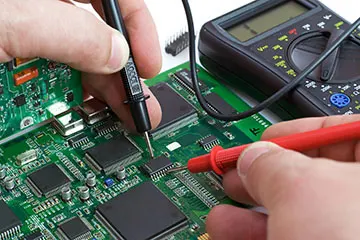Why You Should Consider Outsourcing Your Hospital's Biomedical Services

By Ibby Smith Stofer
Imagine that you have just come home with plans to fix your noisy refrigerator that is not cooling correctly. You are then greeted by your 7-year-old who informs you that Mom is in a bad mood. You ask why and are told that not only is the TV not working, but the washing machine died with a full load of sopping wet clothes.
As you cautiously enter the kitchen, you see your wife bending over the dishwasher with a look of pure anger. She quickly lets you know that the house is cursed and that there are so many issues she doesn’t know where to begin. Being well organized, and not having dealt with all these stressors during the day, you tell her that it will be fine and you will fix them one by one.
Now picture yourself as the lead biomedical technician in a major hospital. Your day often includes a barrage of equipment failures. You and your team need to remain calm and reassuring while what appears to be an endless firestorm of failures continues on. There are respirators, infusion devices, and temperature controlled storage cabinets that all need to be maintained. Not to mention the myriad of devices that interface with your pharmacy, lab, supply chain, and other systems that depend on everything working 24 hours a day, 365 days a year. And you as the biomedical equipment repair team are under constant pressure to reduce costs and deal with the multiple recall notices you receive every day! How are you expected to meet the mounting pressures for patient safety and satisfaction, cost reduction, and clinical satisfaction with your team?
Biomedical and Clinical Engineering staffs across the country are working amid this chaos everyday. At home you have the luxury of calling in a specialist to get things taken care of that you can’t or don’t care to fix yourself. In a hospital the use of outside experts is often out of the question since time is always of the essence. Staff must be trained and that training must be continuous to keep up with the technological changes on hundreds of devices used on a daily basis.

Many hospitals systems have recognized this chaos and realize that the challenges of the biomed and clinical staff have changed dramatically over the years. In the 1990’s and earlier, the devices used in healthcare were predominantly mechanical machines. A lot has changed with medical devices because of the integration of software as well as more advanced circuitry. There is now the linking of devices to systems ranging from pharmacy, patient records, supply chain, and others. Skilled biomedical technicians have to fully understand the complexity of each device and how one fix may lead to trouble in another.
This increased complexity and responsibility can put significant pressure on the clinical engineering staff and require them to work closely with not only clinicians but also with their IT department. As a result of this and the increased pressure to reduce costs, improve care, and ensure system security and integrity, many hospitals and health care systems are choosing to utilize the option to outsource.
Many believe that using a firm that specializes in device repair on a contracted basis may be the answer to reducing the chaos. The training costs alone can often provide a strong motivation to consider outsourcing. Some, especially smaller facilities recognize that their limited staff often cannot keep up with the changing technical issues and elect to use an outside service. Companies who offer outsourced biomedical solutions can meet the very quick turnaround required in hospitals. These outsource companies will often retain many if not all employees and assume the responsibilities for training, security, risk issues and asset management.
When deciding if you should be outsourcing for biomedical equipment repair services knowing what questions to ask is critical to contracting with the right provider. One resource I found particularly helpful was this article from MDDI Online named the 12 Key Questions for Selecting a Supplier. www.mddionline.com/12-key-questions-selecting-supplier.
The bottom line message is that while cost reduction may be the initial reason to consider outsourcing any service area, there is more to consider for it to be successful. Whether the facility is a critical access hospital, a large IDN, a community hospital, or LTAC there are often many reasons to outsource versus using an in-house biomedical service.
For more information on our biomedical services to healthcare facilities visit www.medonegroup.com/oursolutions/biomedicalsolutions
